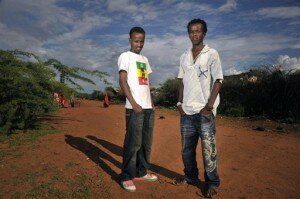Youths Return Amid Probe Into Kenyan Military Recruiting

In this photo taken Wednesday Nov. 4, 2009 Ahmed Omar, left, and Mohamed Ibrahim walk in refugee camp in Dadaab. Kenya. Omar and Ibrahim claim they were recruited into mercenary forces trained by the Kenyan army. Thousands of people, including children, are being secretly recruited and trained inside Kenya to battle Islamic insurgents in neighboring Somalia, according to deserters, local officials, families of recruits and diplomats. Most recruits are Somalis living in crowded refugee camps and Kenyan nationals who are ethnic Somalis living nearby. Kenyan Defense Ministry spokesman Bogita Ongeri denied a secret militia is being formed or that the military was involved in any recruitment or training. (AP Photo/Riccardo Gangale)
Dozens of ethnic-Somali youths in northeastern Kenya, have returned home amid a parliamentary inquiry into allegations they were recruited by the Kenyan military and taken to a military training camp under false pretenses. As our correspondent reports from the northeastern town of Garissa, there is concern that anger over the recruitment efforts could end up radicalizing some ethnic-Somali youth in Kenya.
Two months ago, 24-year-old Garissa resident Siad Dhaqane signed up for a three-month training course that he believed would lead to a well-paying job as a Kenyan border guard.
Dhaqane says that is what the recruiters told him when he went to inquire about the job.  He and about 150 others signed up that day. Several hours later, they were on military trucks, heading south toward Manyani, a training center for the Kenya Wildlife Service outside the port city of Mombasa.
For hundreds of young men in Garissa, including Dhaqane, the training opportunity was nothing less than a way out of the vicious cycle of unemployment and poverty that have long defined a young man’s life in the pastoral, desert community.
On the way to Manyani, Dhaqane says he dreamed about how he would spend the $600 the recruiters said the border guard job would pay every month.
Dhaqane says he was overjoyed by the job offer and was looking forward to the training. But after arriving in Manyani, he and the others were told that they were not going to be trained as border guards, but as soldiers to fight Islamist insurgents in Somalia.  Dhaqane said the recruits were then warned that anyone who tried to leave Manyani would be thrown into jail.
Mohamed Abdullahi Sirat also signed up two months ago with a recruiter, who told him the United Nations was looking to hire workers for a monthly salary of $600.
Sirat says he was sent to Manyani, where he, too, discovered he was being trained to fight in Somalia. He says he and 90 other men recruited with him from Garissa were told they were to identify themselves as Somalis, not Kenyans.
Since the collapse of Somalia’s last functioning government in 1991, Kenya has feared the civil war there would create instability in ethnic Somali regions of the country. For the past several years, the rise of an al-Qaida-linked militant group called al-Shabab in southern Somalia has only deepened worries about security.
In early October, reports began surfacing that the Kenyan government was recruiting ethnic-Somali Kenyans and Somalis in refugee camps to fight for the U.N.-backed transitional government in Mogadishu. New York-based Human Rights Watch said its investigations in Garissa and Dadaab refugee camps found recruiters for the Kenyan government were using deceptive practices and false promises to lure young men.
Since then, the Kenyan military has repeatedly denied it is carrying out a recruitment drive on behalf of the Somali government. Officials in Somalia have acknowledged a recruitment drive in Kenya for its armed forces, but they say it is only targeting Somalis living in Kenya.
It is not clear how many young men in Garissa have been recruited since October. Local media reports have put the number at around 300.
Two weeks ago, several parliament members visited Garissa, Dadaab and Manyani to investigate the recruitment allegations. Soon after their visit, dozens of recruits from Garissa, including Dhaqane, say they were suddenly ordered to return to their homes.
Dhaqane says his name was called from a list. He says each person on the list was told that if he went home, he would be given a job in Garissa or elsewhere in Kenya and a cash reimbursement for the days he spent in Manyani. Dhaqane, who has been back in Garissa for a week, says he has not received anything yet.
In one Garissa neighborhood, some residents are still waiting to hear from their loved ones.
Medina Moge last spoke to her brother, Ahmed Moge Omar, three months ago. She says he called her from Manyani camp, telling her he was being trained to fight militants in Somalia.
Moge says he begged her for some money so that he could escape from the camp. She sent him the money. But she had heard from other people that he had been caught and beaten.
Moge says she and other residents with missing relatives have tried to contact Kenyan authorities, but have received no help or support. She says there is growing suspicion that Kenya’s recruitment drive is being backed by a more powerful country, such as the United States.
She says some people believe the United States is funding this activity because it is a staunch supporter of the Somali government.
Horn of Africa analyst for the International Crisis Group, Rashid Abdi, says he is concerned that even if the recruiting stops, rumors the West played a part in it may linger on.
“This is a suspicion which many have voiced,” said Rashid Abdi. “This is a misperception. But again, it is amazing how much traction it has with increasingly alienated, young generation, who basically believe that there is an anti-Islamic conspiracy at work.”
Abdi warns the Kenyan government must quickly address the rising sense of betrayal and anger in ethnic-Somali communities or risk aiding radical Islamists in their own efforts to recruit Kenya’s poor, disaffected youth.
Comments
comments
 Calendar
Calendar






































